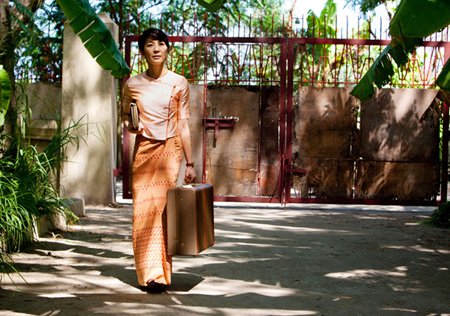UNA-NYC Celebrates International Women's Day with The Lady: Aung San Suu Kyi
Michelle Yeoh in The Lady | Europa Films
With April elections looming in Burma, and the National League for Democracy set to win substantially, NLD leader Aung San Suu Kyi recently delivered her first national televised address as well as preparing to travel outside her country for the first time in more than 20 years. Successfully meeting countless personal trials and challenges, her progressive and selfless work to bring democratic freedom to her country's people has been continually watched the world over, especially since her receipt of the Nobel Peace Prize in 1991 while under house arrest.
On the 2012 occasion of International Women's Day, UNA-NY celebrated her achievements by hosting a special advance screening on March 9 of the new biopic on her life THE LADY, which was directed by Luc Besson (the U.S. release is mid-April). Featuring a genuine career highlight by the highly appealing Michelle Yeoh, and with moving support by David Thewlis as her husband Michael Aris, the film charts Suu Kyi's personal journey through the challenges of weighing tremendous choices, and despite some predictably unsubtle dramatic set-pieces (courtesy of Besson), the film offered some interesting glimpses into what the conjunction of personal and national destinies might consist of.
In order to shed some light on Suu Kyi and aspects of history and current events still unfolding in her native country, Maureen Aung-Thwin, director of The Burma Project (Open Society Institute), was our invited guest at this evening's Screening the Issues presentation. After the film, she shared some facts and behind-the-scenes perspectives on the Burmese situation.
The military rule since 1962, ironically a by-product of the strong national army formed under the direction of Suu Kyi's father, Aung San, as a spearhead of the country's national independence from British and Japanese controls, has come to falter under growing simultaneous pressures of a national popular resistance, a successful media underground, a more ubiquitous world-watch, as well as their own increasingly violent measures against their citizens, even monks — but which they could not bring themselves to apply to Aung San Suu Kyi herself.
Aung-Thwin said that change has unexpectedly come "from the top down," which still seems strange to many. "After 1988, when they crushed the demonstrators, the whole world got very upset… they had sanctions, visa bans, and they became pariahs." Yet even with its widespread poverty, Burma is still "a very rich country," especially when a major player like China came along "to pick them up," becoming Burma's biggest investor.
"I think the monks' uprising in 2007 was like the beginning of the end. Their crackdown on the monks was unconscionable," she said. "In a country where everyone is a devout Buddhist, you're not even allowed to step on a monk's shadow. So can you imagine a monk being beaten, even killed?" After the crackdown, little appeared to change. "But I think everyone internalized it… I have friends who have said: that was the last straw. They just had to do something, whatever it was."
A more trenchant aspect of failure, seen against the realities of the current globalized world, is the incompetence preventing any successful existence of Burmese economy. "Though they have an infantry of 400,000, they can't support it — even with a billion coming in from gas revenues. It's a resource-cursed country… and even with 6 billion in reserves, everyone's poor… they spend about 1% on health and education."
Although some of the generals who have recently stepped down into civilian clothes are interested in reform, others are being "bought out by China," and while others are still sitting on the fence, Aung-Thwin says "we're hoping that people like us, and the world, keep encouraging the reformers. The constitution hasn't been mended… there's nothing that protects the citizens." Even so, writers currently endure less press censorship and the internet is not curtailed (as in China), so there is some freedom for news to travel.
The government has also allowed many "subversive" exiles living abroad to begin returning home to Burma, and Aung-Thwin happily received her own visa this past week, after being blacklisted for almost two decades.
Also, whatever the incumbent success of the NLD, she maintains that ethnic reconciliation is the major issue in Burmese politics. "Unless they figure out how to solve the ethnic problem, it [success] is not going to be irreversible, and there will be no transition that lasts," she said. After more than 60 years of ethnic insurgency, the emerging Burmese democracy could foster such a reconciliation since, while insurgents are divided along ethnic lines, none of the groups has managed to establish authority over the rest, as was the case in Sri Lanka. However, while Aung San Suu Kyi, the elections and visas are constant top news items, the fighting in Kachin, and many other regions even supposedly under ceasefire, still continues and has led to over 70,000 becoming internally displaced around border areas. She encouraged the audience to read a forthcoming Human Rights Watch report which delineates many serious abuses against citizens occurring in Kachin and elsewhere.
Aung-Thwin admits there are divisions in the Democratic movement, which she expects to become more apparent after the April by-elections, when Suu Kyi's party will undoubtedly win their seats and, with her transition from icon to politician, some dissenters will speak out more. However, of much more interest to many Burmese will be the ongoing fallout and dissent among the generals, not to mention a concern that Burma not become "Putin-ized" via the entry into the electoral stream of "mafiosi oligarchs who, by the way, do get elected, you know? It's a danger, but we've got a few tricks up our sleeves to watch that kind of stuff," she chuckled.
She remains hopeful despite all the challenges facing Suu Kyi and the people of Burma, since similar democratic reforms eventually attained success in Indonesia.
We all wish Maureen well on her journey home.

